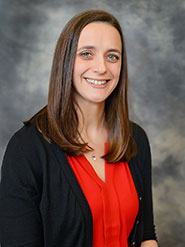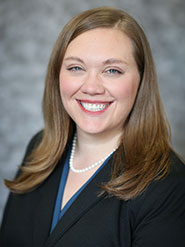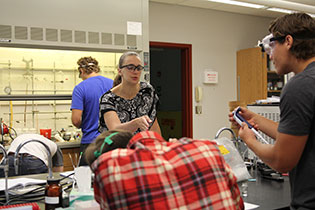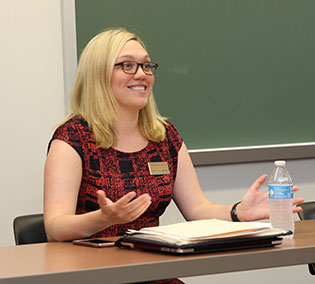A pair of Wabash College professors – Laura Wysocki and Sara Drury – will lead a nearly $600,000 grant from the National Science Foundation (NSF) to study the impacts of deliberation on undergraduate STEM education.
Wysocki, an Associate Professor of Chemistry, and Drury, an Associate Professor of Rhetoric, will lead the efforts on “Developing Deliberative Pedagogy for Use in Chemistry Classrooms” with a team of researchers from three institutions that includes Katherine Knobloch, Assistant Professor of Communication Studies at Colorado State University; Pamela Conners, Associate Professor of Communication Studies, and Amanda Nienow, Professor of Chemistry at Gustavus Adolphus College; and Reni Joseph, Professor of Chemistry at St. Louis Community College. David Brown, principal consultant with Nine Twenty-Four Strategies and Emeritus Professor of Chemistry at Southwestern College, will also collaborate, providing community college expertise for the project.
 The grant builds on the success of one part of an NSF-supported exploratory grant (2015-17), which investigated deliberation in the chemistry classroom. The collaborative nature highlighted in this project allows for an expansion of what was previously accomplished by the Wabash chemistry department and the Wabash Democracy and Public Discourse initiative, enabling Wabash to be a leader in the use of deliberation in the chemistry classroom.
The grant builds on the success of one part of an NSF-supported exploratory grant (2015-17), which investigated deliberation in the chemistry classroom. The collaborative nature highlighted in this project allows for an expansion of what was previously accomplished by the Wabash chemistry department and the Wabash Democracy and Public Discourse initiative, enabling Wabash to be a leader in the use of deliberation in the chemistry classroom.
“Our research shows that students in a non-majors chemistry classroom participating in a deliberation module gain confidence and knowledge about chemistry topics while making connections to complex problems facing society and understanding their urgency,” said Wysocki, the project’s Principal Investigator. “This grant allows us to develop deliberations for science majors – students who will be technical experts in the future with a need to engage the public for more inclusive decision making. It also enables collaboration with other institutions to discover if the positive results seen in our classrooms can be replicated in different environments, which could impact science education more broadly.”
to discover if the positive results seen in our classrooms can be replicated in different environments, which could impact science education more broadly.”
This project will expose undergraduate STEM students to deliberative pedagogy, an approach that teaches respectful conversations by “speaking with” rather than “talking to” diverse stakeholders. Deliberative pedagogy will be applied in undergraduate chemistry courses through facilitated discussion exercises that challenge students to find and evaluate approaches to real-world issues.
“This award is an opportunity to learn more about how critical conversations can lead to innovative, collaborative decision-making,” said Drury, the grant’s Co-Principal Investigator. “The activities in this grant challenge students to consider their roles in socio-scientific issues, reflect on the stakes for and needs of diverse publics, and engage possibilities for working together to improve our shared future.”
The study will determine whether deliberative pedagogy enhances scientific learning, encourages a deliberative mindset, and deepens students’ sense of civic engagement. In addition, by testing the use of deliberative pedagogy in chemistry courses at two four-year colleges and a community college and assessing the impact of facilitator training, the project will investigate whether similar student outcomes can be achieved across diverse institutions and student demographics. The goal is to engage a diverse group of students in multiple educational settings to better prepare graduates to enter the STEM workforce and to be come engaged citizens.
come engaged citizens.
To determine the key factors for successful deliberative pedagogy implementation in a chemistry curriculum, the project will develop and test multiple methods of assessment though academic units for first-year chemistry, biochemistry, and biology students, as well as third-year students in a biochemistry course. In both the first- and third-year courses, student outcomes related to learning and civic engagement will be assessed, and following any needed changes, the units will be implemented at another four-year college and community college to measure translatability. The deliberative pedagogy units created during the project will be made publicly available for use by other instructors and institutions.
This grant will provide opportunities for Wabash undergraduate students to take part in academic year and summer research internships, as well as Wabash Democracy and Public Discourse students to contribute to research for the funded project. Each summer two undergraduate research internships will be made available for students to analyze the data from the study alongside the faculty involved. Finally, in the second and third year of the project, chemistry majors will also have research and leadership opportunities through peer facilitation of deliberations. The grant also provides funding for student internships at other campuses, as well.
year of the project, chemistry majors will also have research and leadership opportunities through peer facilitation of deliberations. The grant also provides funding for student internships at other campuses, as well.
“Collaborations between science and communications are absolutely essential for the advancement of scientific and public knowledge,” said Conners. “This interdisciplinary effort across multiple colleges enacts the values of a liberal arts education and reminds us about how much researchers can learn from each other when we collaborate.”
The NSF is an independent federal agency created by Congress in 1950 “to promote the progress of science; to advance the national health, prosperity, and welfare; to secure the national defense.” The NSF is vital because it supports basic research and people to create knowledge that transforms the future. With an annual budget of $8.3 billion, the NSF is the funding source for approximately 25 percent of all federally supported basic research conducted by America's colleges and universities.